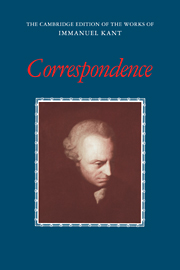Book contents
General Editors' Preface
Published online by Cambridge University Press: 07 September 2010
Summary
Within a few years of the publication of his Critique of Pure Reason in 1781, Immanuel Kant (1724–1804) was recognized by his contemporaries as one of the seminal philosophers of modern times – indeed as one of the great philosophers of all time. This renown soon spread beyond German-speaking lands, and translations of Kant's work into English were published even before 1800. Since then, interpretations of Kant's views have come and gone and loyalty to his positions has waxed and waned, but his importance has not diminished. Generations of scholars have devoted their efforts to producing reliable translations of Kant into English as well as into other languages.
There are four main reasons for the present edition of Kant's writings:
Completeness. Although most of the works published in Kant's lifetime have been translated before, the most important ones more than once, only fragments of Kant's many important unpublished works have ever been translated. These include the Opus postumum, Kant's unfinished magnum opus on the transition from philosophy to physics; transcriptions of his classroom lectures; his correspondence; and his marginalia and other notes. One aim of this edition is to make a comprehensive sampling of these materials available in English for the first time.
[…]
- Type
- Chapter
- Information
- Correspondence , pp. xv - xviiiPublisher: Cambridge University PressPrint publication year: 1999

